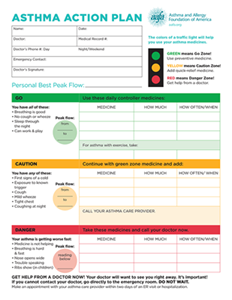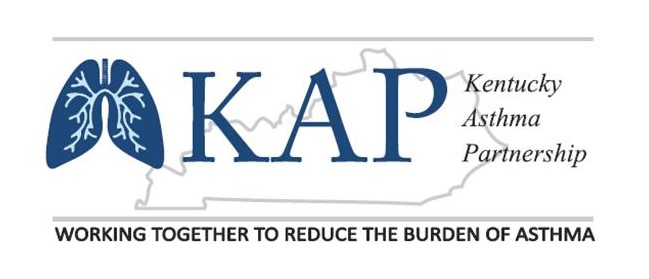Asthma is a lung disease characterized by narrowing of the airways causing repeated episodes or attacks of wheezing, shortness of breath, chest tightness and cough. Asthma attacks can be triggered by factors including allergens (such as pet dander, dust mites, mold, pollens and food allergies), secondhand tobacco smoke, air pollution, exercise, strong odors and cold weather. Asthma is not contagious and anyone can have asthma at any age.
Asthma is one of the most common chronic diseases in the US, affecting more than 20 million adults and 4 million children. Asthma is more common in females than males. Annually, asthma accounts for 13.8 million missed school days for children and 14.2 million missed work days for adults. Nationally, 8.1% of school-aged children (5-17), 8.2% of adults (22-64), and 7.2% of older adults (65+) have asthma. In Kentucky, 11.7% of adults and 6.8% of children have asthma. While asthma can affect anyone at any age, it is more common among blacks. In Kentucky, 13.6% of blacks have asthma compared to 11.3% of whites. Additionally, blacks are twice as likely to die from asthma-related illness as whites.
Asthma has no known cure, but it can be controlled. People with asthma can lead full, active lives with proper education, treatment and management. Asthma management is most successful when you:
- Visit your doctor regularly.
- Use long-term control medications and fast-acting rescue medications appropriately.
- Avoid asthma triggers.
- Work with your doctor to develop and use a written management and action plan.
Successful management and control of asthma results in better quality of life, fewer asthma attacks, fewer visits to the emergency room, fewer hospitalizations and fewer missed school or work days.
Signs and Symptoms
- Coughing from asthma often is worse at night or early in the morning, making it hard to sleep.
- Chest tightness can feel like something is squeezing or sitting on your chest.
- Shortness of breath - some people say they can't catch their breath or they feel out of breath. You may feel like you can't get enough air in or out of your lungs.
- Faster breathing or noisy breathing.
Inflammation causes airways to become constricted and narrow. Narrowing of the airways, called bronchoconstriction, produces shortness of breath, tightness in the chest, coughing and wheezing.
What Can You Do?
Remember: Taking care of your asthma is an important part of your life.
Self-Management

A written self-management asthma action plan is useful for asthma patients. Health care providers prepare individualized plans detailing adjustments to patient medication based on their asthma symptoms and peak flow meter readings. This plan can help you know what to do during an acute increase in symptoms (an acute exacerbation). If you ever are in doubt about what to do during an acute asthma exacerbation, you should contact your healthcare provider. Sample Asthma Action Plan
Asthma Action Plans
Tobacco Prevention and Cessation
The use of tobacco in any form is a great health concern. Even if you don't smoke, reduce your exposure to secondhand smoke. If you use tobacco products, quit as soon as possible.
Control Your Environment
An important part of asthma management is to control contributing environmental factors. Common asthma triggers found in the environment include pets, molds, perfumes, dust mites and medications. Be aware of your asthma and symptoms, so that you can take action quickly at the sign(s) of an attack.
Working with your health care provider:
- Learn about your asthma and how to control it. Work closely with your health care provider.
- Use medicines as directed by your health care provider to prevent or stop attacks.
- Get regular checkups from your health care provider.
- Stay away from things that make your asthma worse as much as possible.
- Follow your Asthma Action Plan and work with your health care provider on your plan.
The American Lung Association has several resources available on Clean Air at Home.
EXHALE Strategies to Help People with Asthma
EXHALE is a set of six asthma prevention and control strategies to help people with asthma breathe easier. The evidence-based strategies are proven to reduce asthma-related hospitalizations, emergency room visits and health care costs. The
EXHALE Strategies were developed by the National Asthma Control Program of the Centers for Disease Control and Prevention. The Kentucky Asthma Management Program uses EXHALE to improve asthma outcomes in the commonwealth. Details and resources on implementation of the strategies can be found in the EXHALE infographic and EXHALE flyer, created in cooperation with the Kentucky Environmental Public Health Tracking Network.
The strategies are:
-
Education on asthma self-management such as teaching people with asthma how to use medications correctly.
-
X-tinguishing smoking and exposure to secondhand smoke which can trigger asthma attacks that require emergency care or hospitalization.
-
Home visits for asthma trigger reduction and self-management education. including home environmental assessments to identify common asthma attack triggers such as cockroaches and mold.
-
Achievement of medical management objectives by using decision support tools such as treatment algorithms or reminders.
-
Linkages and coordination of care across settings to connect people with asthma to needed healthcare and social services.
-
Environmental policies or best practices to reduce asthma triggers from indoor, outdoor and occupational sources such as modifying older school bus diesel engines to run more cleanly and reduce air pollution.
CDC Guides on Using EXHALE can be used by:
- Health care professionals,
- Health care system executive leaders,
- Managed care leaders and staff,
- Medicaid and Children’s Health Insurance Program leaders,
- People with asthma, their families and their caregivers,
- Public health professionals, and;
- Schools.
Asthma Capitals: The Most Challenging Places to Live With Asthma
The Asthma and Allergy Foundation of America released the Asthma Capitals 2025 report to coincide with Asthma Peak Month (September) and Asthma Peak Week, the third week of September annually, when a spike in asthma attacks and emergency department visits are seen. The report is intended to inform and raise awareness of the nationwide impact of asthma. The report analyzes data from across the United States and ranks the top 100 most challenging places in the U.S. for living with asthma based on asthma prevalence, asthma-related emergency department visits and deaths due to asthma. The report also highlights asthma risk factors that influence health outcomes, including poverty, air quality, pollen allergy, medicine use, tobacco policies, access to specialists and the rate of uninsured residents. Louisville, the only Kentucky city listed in the report, ranked 49 of 100 (average), and was considered average in terms of asthma prevalence, better than average regarding deaths due to asthma, and worse than average for asthma-related emergency department visits. In 2024, Louisville ranked 40 of 100 (average); in 2023, Louisville ranked 34 of 100 (average); the 2022 report ranked Louisville as 17 of 100 (worse than average).
Allergy Capitals: The Most Challenging Places to Live With Allergies
The Asthma and Allergy Foundation of America released the Allergy Capitals 2025 report, which identifies the most challenging cities for seasonal allergies in the top 100 metropolitan areas in the continental United States. The report looks at three important factors: tree, grass, and weed pollen scores, over-the-counter allergy medicine use, and availability of board-certified allergists/immunologists. The report aims to raise awareness on the impact of seasonal allergies on health and notes that the burden of seasonal pollen allergies falls heavily on the eastern and southern parts of the country. This report focuses on three topics related to seasonal allergies: self-care for allergic rhinitis, pollen sensors, and climate change and allergies. In the 2023 report, Louisville was ranked 89 of 100 overall (better than average), and is the only Kentucky city listed in the report. In the current report, Louisville remains the only Kentucky city listed, however, the ranking dropped to 69 of 100 overall (average).
Kentucky Asthma Partnership

The Kentucky Asthma Partnership is a 501(c)3 organization dedicated to increasing awareness of asthma in Kentucky. The Kentucky Asthma Management Program works closely with KAP to provide updates on asthma data, webinars, resources, news, research and more. To receive updates or to join KAP, contact us today.
KAP Facebook
KAP X (formerly Twitter)
KAP Symposium 2026
Information coming soon!
KAP Symposium 2025: Quality Asthma Care - It Takes a Village
The Kentucky Asthma Partnership hosted the Annual KAP Symposium 2025 in Lexington on May 7.
KAP Symposium 2024: Next Gen - Partnering for the Future of Asthma Care
The Kentucky Asthma Partnership hosted the Annual KAP Symposium 2024 in Louisville on May 8.
KAP Symposium 2023: Asthma and Appalachia - An Old Disease in a Changing World
The Kentucky Asthma Partnership and Kentucky Asthma Management Program deemed the event in Pikeville a success! So happy to visit with our Eastern Kentucky partners. Thanks so much to our vendors, sponsors, speakers, and of course our attendees. The presentations are linked below for those who were unable to attend.
KAP Symposium 2022: Bugs and Drugs
The KAP Symposium was a success thanks to our vendors, sponsors and speakers. Also, thank you, symposium attendees. The presentations are linked below for those who were unable to attend.